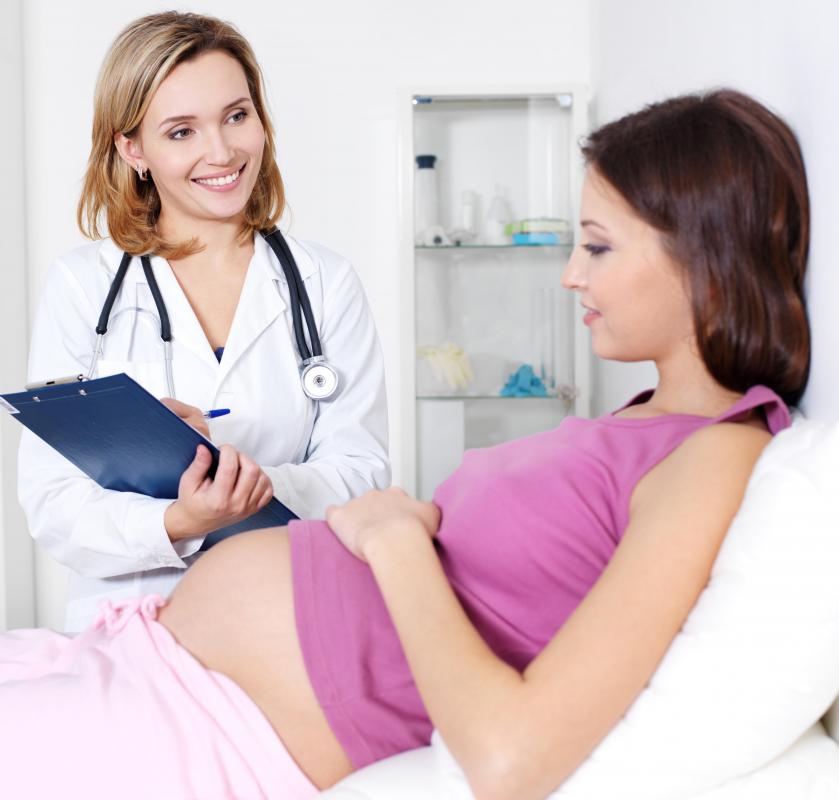At WiseGEEK, we're committed to delivering accurate, trustworthy information. Our expert-authored content is rigorously fact-checked and sourced from credible authorities. Discover how we uphold the highest standards in providing you with reliable knowledge.
What Happens to the Body in Early Pregnancy?
There are many changes that occur in the body during early pregnancy, as well as throughout the entire pregnancy; breast tenderness, morning sickness, and frequent urination are some of the most common. Many women notice that their breasts get slightly larger during this time. In addition, nausea and vomiting during pregnancy can occur at any time of day, despite being called "morning sickness." Nausea often passes after the first trimester, but some women experience it throughout their entire pregnancies.
The first sign of pregnancy is often a missed period. Some women can detect changes in their bodies even before they are able to take a pregnancy test, however. Once a woman has taken a pregnancy test and it is positive, she should visit a doctor for a blood test to be sure. The doctor will then begin scheduling regular appointments throughout the entire pregnancy so she can carefully monitor the changes in her body and to be sure the baby is growing normally.

Hormonal changes are some of the greatest changes in the body during early pregnancy. These hormonal changes can lead to mood swings, extreme fatigue, and even constipation. It is important for the woman to eat a healthy diet rich in fruits, vegetables, iron, and fiber, as well as to drink enough water and take prenatal vitamins; this can help to regulate the mood and slightly boost energy levels. As the uterus starts to grow, frequent urination is common in early pregnancy because it begins to press on the bladder.

Changes in the body during this time can also cause a woman to experience food cravings and aversions. In addition, weight gain will begin in early pregnancy and continue throughout the entire pregnancy; doctors usually try to monitor weight gain to be sure that the woman is not gaining too much weight, but it is important to gain enough weight in order to ensure that the baby is growing properly. Most women will not begin to "show" until the second trimester, however.

Many women find that their hair and nails grow extremely well during early pregnancy and throughout the entire pregnancy, due to the hormonal changes and the prenatal vitamins. Skin changes are common as well; some women experience very clear skin, while others get acne. Each woman is different and each pregnancy is different, so the changes in the body may vary in different pregnancies. Any concerns should be addressed to a doctor.
AS FEATURED ON:
AS FEATURED ON:
















Discussion Comments
When I was younger and didn't want to get pregnant, I would obsess over every twinge of nausea, thinking I might be pregnant. But I later learned that nausea isn't necessarily the first of the early pregnancy symptoms women notice.
When I did get pregnant the first time, what I noticed first were breast changes. I would always get a little sore before my period, but that time it was just a bit different. I didn't experience any nausea until I was six weeks along, so two weeks after I found out, and even then it wasn't very serious for another week or two.
The moral of the story is *not* to obsess looking for early symptoms. Know your cycle, know when to take a test.
One very early pregnancy sign that some women experience is implantation bleeding. This happens about 6-10 days after ovulation (remember, the actual sex might have been a few days before ovulation) when the fertilized egg implants in the wall of the uterus. It can be anything from a few drops to a couple days' worth, but it will usually be pink or brown - not bright red. I had it with one pregnancy, but then not with the other - I was a little surprised when I didn't get my period because of not having had the implantation bleeding that time.
After implantation is when you can start experiencing symptoms. Before that, the body has no idea you're pregnant! As far as it's concerned, until implantation takes place or menstruation begins, the jury is still out.
Some women who are not very in tune with their cycles (and, I guess, have light/irregular periods) can mistake implantation bleeding for their periods, but this is really uncommon. If you bled red blood at around the right time, you are almost certainly not pregnant.
Post your comments